I just had to end it on a Half-Life 2 reference.
By Video_Game_King 38 Comments
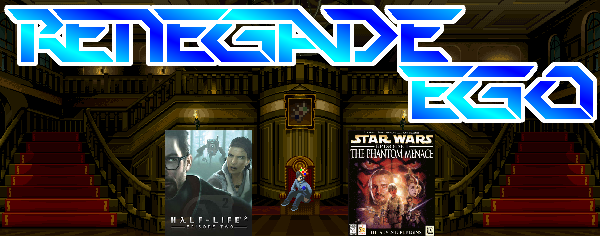
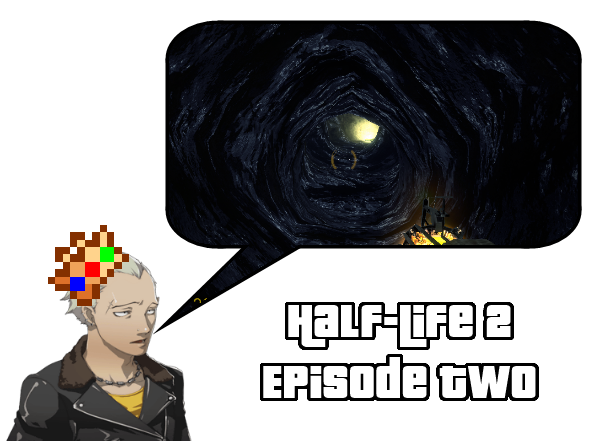
......Do I count this as modern or old school? Well, either way, I'm finally tackling Episode Two (after years of anticipation!), and I have to say that it's.....not that good. Now, I'm not saying that it's a bad game.....actually, let's go with that. For whatever reason, the game embraces first person shooting mechanics when it absolutely shouldn't. Features that could once stand on their own feel out of place or at odds with each other, and there's not much hope that Episode Two can recover from such mistakes.
I see that you have already prepared your nooses and pitchforks. But hold off on that for a second, because I'm gonna start things off by listing a feature that I actually like: the world design. I'm not even completely sure what I like about it so much. That's not an insult against the game, but more a comment on how difficult it is to pin down what makes the environments work. Is it the vague hints of a supernatural, spiritual ethos permeating the atmosphere? Or maybe it's the dead, industrial forest motif going on? Again, I don't know what exactly it is; all I do know is that it works. The world looks absolutely gorgeous, and I just want to explore every nook and cranny, see every little thing that the world has to offer me. It's a great way to ensure that I stay through to the end.
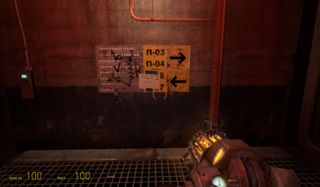
And the story is.....problematic. Actually, that's misrepresenting the situation. The story does some interesting things. We pick up immediately after Episode One, wherein Gordon Freeman and Alyx Vance blew up a giant tower or something. Unfortunately, said tower-blowing-up has created an evil portal or something, and it's up to the two heroes to close said portal once and for all. Well, until a Hunter rips Alyx's guts out that is. Although an early plot twist, it's handled really well, conveying just enough emotion to matter, but not so much that it's imposing. But that's not important. What is important, however, is that the story now shifts away from the Combine and more toward the relationship between Alyx and Gordon. Of course, being mute, Gordon can't directly express his character through dialogue, but all the stuff he does to save her should prove just how much she means to him. It's an interesting look at how to characterize somebody through actions rather than through words.
Until the game puts a gun in your hand, that is. Did I not mention that? Episode Two's a first person shooter. You look at things and shoot them. Why? I'm not quite sure. It's an awkward fit, to say the least. You spend much of the game saving Alyx from a large wound in her stomach, not a giant turtle king that's captured her for his own amusement. What place does shooting have in this world? I'm not even certain the game knows itself. Most of the weapons Gordon finds in the game are just that: found. They're lying around for him to pick up, as if the game couldn't figure out how to give him these murder tools in a way that mesh well with the story it was telling. It's almost like Valve felt obligated to work shooting elements into the game somehow, and the larger experience suffers because of it.
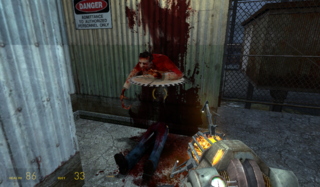
I believe we can establish this by looking at just what you're fighting over the course of the game. For a good half of Episode Two, it's nothing but antlions and zombies. Both enemy choices situate you as the bad guy. Those zombies can't aggress; they have no free will to do so. They're screaming in pain, and only attack out of desperation. Your response? Gun the ever loving crap out of them and don't look back. Well, that's worrying. Maybe the antlions are better? I mean, at least they can aggress. In fact, they do, and I'm pretty sure it's related to the fact that the people of this world essentially built their houses on the poor things' nesting grounds. Knowingly, I might add; one of your Vortigaunt buddies mentions how his kind are skilled in antlion eugenics, and have been for many a generation. This knowledge presumably carries with it the knowledge of what pisses them off, and I have to imagine tearing down their homes and replacing it all with noisy, disruptive machinery ranks up there as one of the better ways to get on their bad side.
Now, all of this could be ameliorated if the game acknowledged this and somehow worked that moral dissonance into the storyline. Unfortunately, that isn't really the case. I can't remember any point in the game where anything remotely like that happens. Yes, the writing characterizes some of your allies as idiots, but it does so for reasons completely removed from what I've been discussing. I'd say that their decision to build next to a goddamn antlion nest might as well be their smartest decision, but Episode Two doesn't even bring up said decision as a topic of discussion. It doesn't even encourage you to ask why the antlions attack you with such malice. In fact, they might as well be meaty targets who only exist for your own amusement. (The sick guitar licks certainly aren't helping.) The poor little guys are just defending their homes and their children from a small group of guys mercilessly killing their friends, family, neighbors, and who knows what else. What possible justification could the game give for any of this?
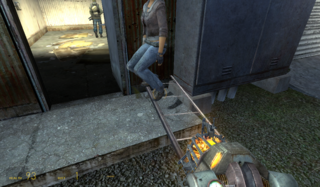
Well, to be fair, you do eventually fight an organized military force that knowingly and intentionally attacks you without much pretense for self defense (or at least not as much). But man, does the game take its sweet time bringing them out. It takes almost half the game before Episode Two's ready to acknowledge them, and when it does, it feels reluctant to do so. This much is evident as soon as said military force enters the picture. Alyx has just recovered from her horrific injuries (I guess), meaning she and Gordon can finally resume their journey to White Castle Forest. As they exit the caves, they spot a Combine battleship flying across the sky. As players, we finally have a clear antagonistic force to work against. Seconds later, you're shooting down the same antlions you've been shooting for the previous 50% of the game. Guess the game isn't quite ready to commit to an unambiguous bad guy, is it?
I feel I should also mention that Gordon Freeman occupies no space within this world. Granted, that's one of the less important problems the game has to deal with, but it's a problem nonetheless. The Freeman does not walk upon the Earth, like you or I would, but glides ever so slightly above it, presumably with the power of his mind. That power's also how he interacts with the world around him, because I can't think of any other explanation as to how he can reload a shotgun while turning a valve. That one's a lot harder to ignore, since a good percentage of the game is nothing but turning valves. It's jarring, to say the least. (The lack of presence, although the high number of valves also leaves me worried.) It only serves to remind me that I'm playing a video game; exactly what Episode Two doesn't need. For a game whose greatest strength is the world it crafts, it sure does a lot to make you feel removed from it.
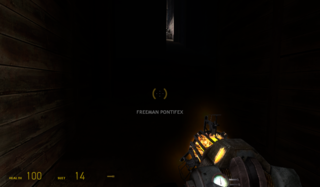
You can find one particularly egregious example just by looking down and walking forward. You don't see any feet moving down there, but you can hear footsteps being made. Hell, different sounds play depending on what you're walking on. Normally, that would be a fine attention to detail, but without any feet, this implies some very worrying things. It means that somebody on the development team was assigned to produce various footstep sound effects, and another person was assigned to make sure they play under very specific conditions, but nobody thought to animate or even model the damn feet that actually make these noises. What a worryingly strange dedication to (a lack of) detail.
How did Valve....OK, I think I'm getting it. Don't you see? It's all making sense now. The ten or so rockslides preventing me from exploring anything outside the immediate path; the boulders that fail to elicit a response from Alyx when they're Gravity Gun'd into her brain; the series of caverns I explored in search of vital medicine (that I could've reached via the elevator I used to exit said caverns); that stupid helicopter chase sequence where you're being attacked with explosions and rock music; the inexplicably weak second half of the story, forgetting about a newly introduced plot element until it's needed for a cheap twist at the end of the game....this is a dumb action movie. Thematic implications and creating a cohesive world mean nothing when you can just shoot to your heart's delight.
Of course, even under these standards, the game falters. It doesn't fail, mind you; the shooting can be quite decent. The frantic, hurried, chaotic pace to each encounter mixes quite well with the similarly hurried pace running through both of the major story arcs AND it's pretty damn fun. Unfortunately, said sense of fun is usually balanced with plodding shoot-outs that feel less like a triumphant bang and more like an impotent squib, so the shooting's a wash, overall. The puzzles aren't much better, often sufficing with simple physics puzzles or plugging things in (to fix short circuits, strangely enough); not exactly the most engaging material the game can muster. It's painful, really, typing out all these sentences utterly lambasting Episode Two. I mean, the ingredients are there for a good game. Or maybe for good games. It's the BioShock Infinite problem all over again: decent enough components when examined separately, but when you look at them in the context of each other, it's hard to ignore the mess it becomes. Tell me, reader, if you can. This game sucks so much. What is it, exactly, that makes it worth playing? Can you name even one thing?...I thought not.
Review Synopsis
- Just shoot shit up, man. Ignore the myriad story problems with this set up.
- And the far less significant mechanical problems.
- At least the world's interesting (although if we're going that route, I'd probably cut out the middle man and recommend Dear Esther instead).
I think we'd ALL like Twilight Princess a bit more if it was just Ganondorf licking everything in sight.
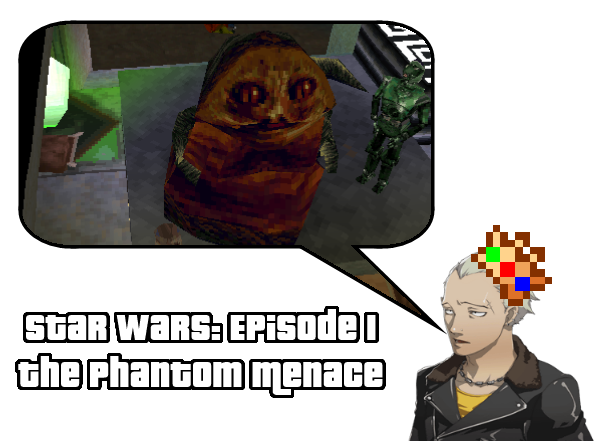
OK, so what's the story behind this decision? The word "episode". That's it. Both of these games have the word "episode" in their titles. But strangely, things worked out fine in the end, because both of these Episodes share very similar problems. Much like Half-Life 2: Episode Two before it, The Phantom Menace can't quite get its story and its gameplay in perfect agreement. What should have been a space-hopping epic topped off with tales of political intrigue ends up a clumsy, plodding mess of an experience.
Of course, the traditional narrative (for lack of better phrasing) isn't completely off the hook, despite its initial promise. It all begins with the greedy Trade Federation (not my words) blocking trade with the planet of Naboo. The Galactic Republic, pissed that they're no longer able to buy swamp roots or whatever the hell the planet produces, decides to send in some Jedi Knights to muscle away the problem. So far, so good. We've got the promise of some tense political maneuvering to look forward to, along with monks whacking things with their laser swords in case the former becomes too boring. How are we gonna deliver on that?
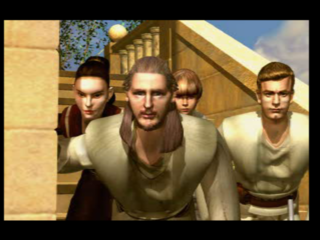
Well, if you're The Phantom Menace, you focus most of your energy on dull, boring subplots. Jar Jar Binks readily comes to mind, and while I agree with you that he sucks a bag of racist dicks (the dicks are all wearing Klan hoods), I personally see Anakin as more corrosive to the story. Once he enters the picture, both of the appeals I listed before are thrown right out the window, which is a lot worse than you're probably thinking, since this is the Star Wars universe and everything. Anyway, the story moves away from that other stuff and towards pod races and freeing the boy from his slave life.
All because Qui-Gon Jinn needs some spare parts for his ship. What an underwhelming motivation, especially given how this ordeal comprises pretty much the entire second act. If you're gonna devote so much attention to some kid you introduce a third of the way through the story, he'd better play an absolutely vital role to what's happening in the story. Sadly, that's not the case; he's freed, mentioned as the chosen one (mentioned because he kind of disappears after being freed), and overall does nothing to justify the level of importance placed upon him. Is that really why people want to play this game? For a little kid who just sort of exists? What about the robots pursuing the Queen (who happens to be Princess Azula, for some reason)? Don't they deserve some development?
So far, I've only talked about how the.....I still don't have decent phrasing. How about we talk about the gameplay? Specifically, the level design, largely because it doesn't do the story any favors. First, the dead space. You're gonna spend a lot of time in these levels simply wandering around, looking for some purpose that the developers forgot to implement. This brings the pace to a screeching halt. The lack of (otherwise outstanding) music certainly doesn't help. What was once exciting becomes prolonged, and what was once prolonged becomes torturously awful.
But perhaps more importantly, the level design renders the world ridiculous. Most of the levels force you to jump between ledges, push boxes, collect pass keys, and engage in every other staple of early 3D game design. It's about as fun as you'd expect, but to look at it in terms of fun would be to miss the point entirely: how does any of this fit into the world? I mean, without all that other stuff, the worlds are amazing. They're just so intricate and thoughtfully designed. The worlds you explore just breathe life and personality, almost as though people actually live in these worlds and conduct their daily business in them. That is, when they're not pushing blocks to fetch their car keys (which, for whatever reason, are hanging off a support beam) or removing their groceries from their secret-activated cabinets to make room for medkits or the errant grenade. You see the problem here, right? It's exactly what happened with Episode Two before/after it: I'm reminded that I'm playing a game. No longer am I Qui-Gon Jinn, confusingly named Jedi Master, effortlessly slashing my way through the droid armies; now I'm just some schmuck pushing buttons to make things happen. Of course, The Phantom Menace doesn't fare much better when it's trying to create atmosphere (fucking Mos Espa), but game-centric design isn't the way to go, either.
This even holds true under fun conditions. By which I mean light saber battles. Because it's impossible not to have fun with a light saber, especially when you're using it to slash bullets instead of people. (You also get to fight using guns and grenades and stuff, but why a magic space knight would use any of that is beyond me.) Yes, actually bouncing those bullets back is awkward and takes getting used to. They reflect back based on where you're facing, but the precision means that a laser can hit you right on and be reflected 90 degrees into the next star system. For many, that may be too precise, and while I agree with you, I add the caveat that such precision brings with it a new layer of skill in learning how these systems work. Think of it like the cherry atop the true appeal to be found in the combat. That appeal, of course, is watching a group of droids open fire on you and somehow manage only to kill themselves.
But let's flip this around and look at the combat in terms of the story. You're supposedly playing as some of the top Jedi in the universe on a mission of the utmost importance, so it's safe to say that they know what they're doing. Why, then, do all their fights come across as clumsy drunken slapstick? Seriously, it's hard to name a single fight that didn't end with the Jedi recklessly swinging their sabers about and hoping something happened. A major military conflict is not the place to reenact your favorite Three Stooges sketches, guys.
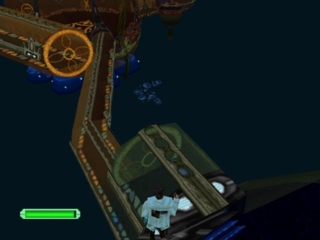
Darth Maul gets it the worst. In the movie that I don't know if I've ever seen, I have to imagine he fulfills some sort of role as this super ominous bad guy who has a reason to exist. What that reason is, the game doesn't make clear. The guy introduces himself by pushing over some rocks and then slapping you about for no explained purpose. He continues to do this until you chuck him down a giant hole on a completely different planet. In short, Darth Maul's less a foreboding villain who connotes dread and more an insane nuisance you have to deal with every now and again. Hard to take the story seriously when this is the closest thing we have to a clear antagonist, isn't it? I'd also mention how Queen Azula can survive an entire belt of ammunition to the face yet collapses dead when her escort walks 50 yards away from her, but I feel I've made my point by now.
Simply put, this game's crap. Or, perhaps more specifically, this is crap because it's a game. The combat and the levels mi....OK, there's no chance they would've worked in any other game, but they especially don't work here. The Phantom Menace has an agenda, and block puzzles don't fit anywhere into it. There might have been a way to make a good game based on The Phantom Menace (I seem to remember that pod racer game being pretty good), but this certainly wasn't it. Tell me, re-wait, I've already used that one......I'm gonna need a bit more time to come up with a decent Half-Life 2 reference. In the meantime, this is where I get off.
Review Synopsis
- Turmoil has engulfed the Galactic Republic. The taxation of trade routes to outlying star systems is in dispute. But let's ignore that in favor of some ultimately inconsequential pod races.
- Apparently, "a galaxy far, far away" doesn't preclude Mars. (That's supposed to be a Doom joke. Because of all the colored keycards.......*ahem*)
- I have to admit, though, that the game is extremely faithful to the highly visceral fight between Darth Maul and the two Jedi.